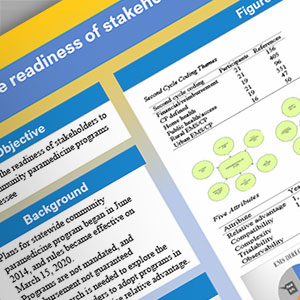ABSTRACTS
Assessing the Readiness of Stakeholders to Adopt Community Paramedicine Programs in TennesseeAuthor: Roger Ritchie PhD, MPhil, MPA, BS, EMTP | | Walden University/Grainger & Hancock Counties EMS Associate Authors:
Community paramedicine is an emerging model of care that promulgates EMS in a more community-based and integrated role within the broader health care system. A hallmark characteristic of community paramedicine is that programs are designed to meet the specific needs of a given community, rendering programs unique but perplexing. A need for subsequent research aimed at exploring possible barriers that may impede the adoption and implementation of community paramedicine programs has been identified by the National EMS Advisory Board, the North Central EMS Institute, and the Joint Committee on Rural Emergency Care. The purpose of this study was to explore opinions, attitudes, and beliefs among key policy makers regarding the adoption of community paramedicine programs in Tennessee. Rogers’ diffusion of innovations was the theoretical framework for this qualitative case study, and a single overarching research question was used to solicit opinions among participants. Qualitative data were collected through semistructured interviews from 21 participants, including 13 EMS directors or other officials, physicians, county mayors, and home health representatives. The data corpus was coded to identify emerging themes, and both inductive and deductive processes were used in analysis. Findings emphasized various perceived attributes, but also indicated a lack in understanding of program definitions and parameters. Recommendations include further research on how programs may affect other health care providers, especially in rural settings. Implications for social change include providing a better understanding of community paramedicine and how future programs may best benefit patients in both rural and urban areas.
|

